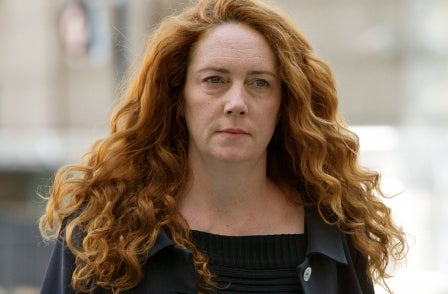
Lord Justice Leveson has criticised leaks from his inquiry, including this week’s revelation that Scotland Yard loaned a horse to former News International chief executive Rebekah Brooks.
The Metropolitan Police informed the Leveson Inquiry on February 14 that Ms Brooks “fostered” a retired police horse called Raisa between 2008 and 2010.
Details of the loan of the animal were revealed by the Evening Standard newspaper on Tuesday, prompting fresh criticism that Scotland Yard was too close to News International.
Lord Justice Leveson warned today that he could restrict advance release of witness statements to core participants – people who have a significant interest in the hearings or may face criticism – if the leaks continue.
He said: “I am concerned to hear that over the last two days requests have been made to the Metropolitan Police for confirmation of details which suggest that there has been prior disclosure of the statements of some of the witnesses who are due to give evidence to this inquiry.
“I am disturbed about it, not only because leaks would constitute a breach of the confidentiality agreement that everybody has signed, but also because it runs the risk of disrupting the way in which this inquiry can proceed.
“I don’t intend to seek to make inquiries as to these particular leaks. But if this continues I shall review the way in which I provide pre-warning to core participants of statements of witnesses.”
Lord Justice Leveson did not specify which leaks he was referring to, but it is understood they include the story about the horse loaned to Brooks.
News International ‘clsoed ranks’ over hacking
Meanwhile, the inquiry also heard that News International “closed the ranks” and refused to co-operate with Scotland Yard’s original phone hacking investigation.
Peter Clarke, former head of the Metropolitan Police’s counter-terror division, said he had a feeling the practice of illegally accessing voicemails was “endemic” in parts of the media.
However he defended his decision to restrict the scope of the investigation in late September 2006, despite evidence more journalists had carried out phone hacking and there could be many more victims.
The inquiry heard yesterday that police were obstructed, photographed and feared they might be attacked when they searched the News of the World‘s (NotW) offices for phone hacking evidence in August 2006.
Clarke said today: “In terms of the investigation, it became immediately apparent that we weren’t going to get any co-operation whatsoever from News International.
“Normally when one deals with something that’s happening within a large international organisation or indeed a large national organisation, companies bend over backwards to try to preserve their reputation and assist with inquiries.
“This was a closing of the ranks from very early on.”
NotW royal editor Clive Goodman and private investigator Glenn Mulcaire were jailed in January 2007 after they admitted intercepting voicemail messages left on royal aides’ phones.
The retired Met assistant commissioner told the press standards inquiry he suspected that other journalists were also involved in hacking.
‘Invasions of privacy are odious, obviously’
“If one journalist and a private investigator had found a means of doing this, it was probably inconceivable that more were not engaged, whether in that particular paper or wider,” he said.
“I suppose it’s a cynical view of an old police officer – if somebody is arrested for burglary, the chances of it being the first time they committed a burglary are slim.”
Clarke said he decided not to widen the hacking inquiry to cover other suspects and other victims in the light of the massive terrorist threat to the UK at that time.
Two days after the arrests of Goodman and Mulcaire on August 8 2006, police swooped on an extremist cell plotting suicide attacks on transatlantic airliners with the aim of killing hundreds of innocent people.
Clarke told Lord Justice Leveson that counter-terror investigations outweighed “circumstantial” evidence in the phone hacking investigation.
“The circumstantial evidence against journalist A, B or C is a minor consideration in comparison with the consideration of what poses a threat to the lives of the British public,” he said.
“Invasions of privacy are odious, obviously. They can be extraordinarily distressing and illegal but they don’t kill you. Terrorists do.”
He also insisted he “absolutely” was not put under pressure by NI to shelve the inquiry. Clarke said he thought carefully about passing the investigation to another part of the Metropolitan Police but concluded this would be “totally impractical”.
He stressed that the 11,000 pages of names and telephone numbers seized from Mulcaire had been “looked at but not analysed”.
“That quite clearly would have been an enormous undertaking. It would have taken dozens of officers months if not years,” he said.
“The fear that the scale of resource commitment, where this would inevitably take us, was mainly what led me to take the decision that we would not go into it. It was disproportionate in terms of other competing demands at the time.”
Email pged@pressgazette.co.uk to point out mistakes, provide story tips or send in a letter for publication on our "Letters Page" blog
